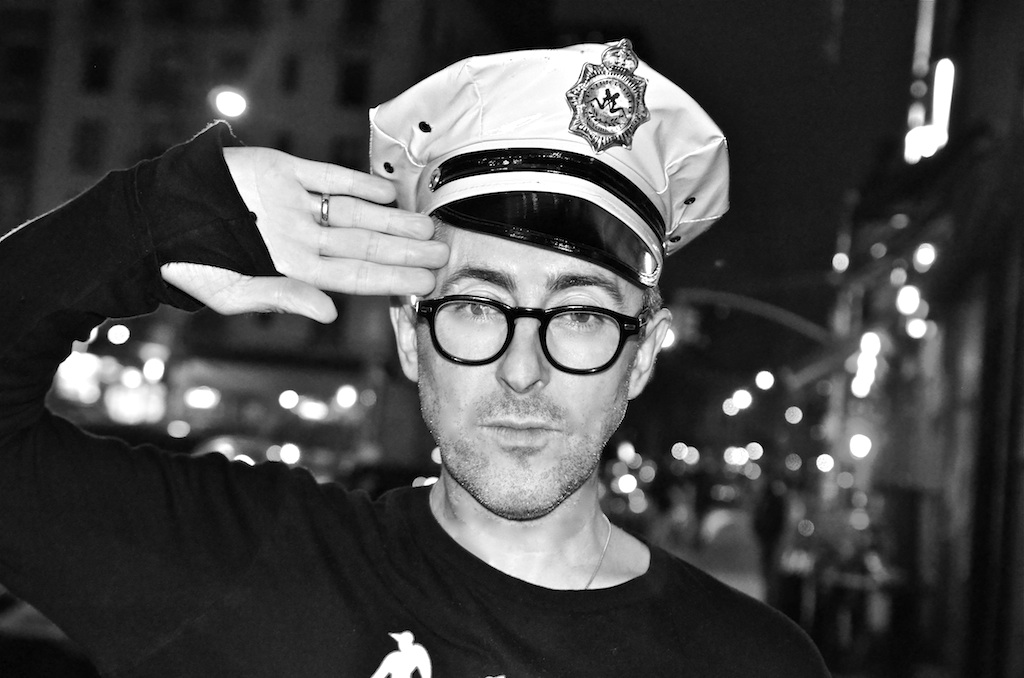Alan Cumming Is Not Afraid of Macbeth

ABOVE: ALAN CUMMING IN NEW YORK
This Sunday, Scottish-born and New York-based actor Alan Cumming will open his one-man production of Macbeth at the Ethel Barrymore Theatre on Broadway. As Cumming points out when we talk to him over the phone, technically, it is not a one-man show. Set in a Victorian-era mental institution, two actors appear on stage—Jenny Sterlin as the doctor and Brendan Titley, who plays the orderly—but there are shadowy figures with minimal dialogue in the grim atmosphere of the dimly lit psychiatric ward, sparsely furnished with a small cot, clawed bathtub, and chair. Cumming is the only patient, reliving the dark tale as Macbeth, Lady Macbeth, Macduff, Lady Macduff, the three witches, and about a dozen other characters. In addition to these Shakespearean roles, Cumming is also playing Fred, the patient.
Undoubtedly, the size of the cast has cut down the astronomical costs of most Broadway productions. Led by directors John Tiffany and Andrew Goldberg, this production premiered in Glasgow at the National Theatre of Scotland in June 2012 and had a New York run at the Rose Theatre in Lincoln Center in July 2012. It’s a multimedia affair, with closed circuit cameras recording the patient’s movements on a trio of TV screens.
In a role that entails lots of energy and nonstop stage time, Cumming is spritely, limber, and effervescent. Alluding to the superstition of uttering the play’s title onstage, Cumming announced on Twitter last month that he was “going to say Macbeth everywhere, even in the theatre. None of this Scottish play stuff for me.” This did not stop the producers from putting up a sign in the lobby asking audiences to not mention the title while on the premises. Although the 48-year-old actor follows a training regimen that includes yoga and swimming, he’s already sprained a rib, clogged his ears, and stubbed his toe.
GERRY VISCO: Playing all of the characters in Macbeth is obviously a very physically demanding role. How does it feel to do an hour and 45 minutes like that all by yourself?
ALAN CUMMING: It’s a really weird experience. It requires a lot of stamina, and a lot of things that you don’t normally think about.
VISCO: Like what?
CUMMING: [coughs] Like if you want to cough, for instance, you can’t. Usually when you’re onstage there’s always someone else speaking, so you can swallow, you can cough, you can burp, you can fart. The thing I find the hardest is that there’s always things during the show like “I didn’t remember to say that!” or “That lighting cue, that line!” Just little technical things. And, of course, you have no time to process anything because you’re just on. On, on, on to the next thing. As soon as I come offstage, I have a blackboard on my dressing room door and I write as many things as I can remember. But you’re just so in the moment; there’s no time to process or to analyze or anything. In all aspects, that’s really quite exciting, but very difficult. It’s like being a whirlwind.
VISCO: You’re playing a mental patient who’s channeling the characters from Macbeth. Is it out of boredom—something to keep him busy? Is his representation as a mental patient accurate, or is it his own interpretation as an unreliable narrator?
CUMMING: You’re seeing into the mind of this person, his psychosis. Some things happen that are not really happening because you’re inside his mind. The production gets more insane as he gets more disturbed. The audience is brought into his mind and it spirals. It’s pretty intense, but I think I know what to expect. I know where we’re going. When it’s really a surprise…I feel for the audience. I think it’s an amazing experience to have in the theatre, but it’s not what you’d expect. The way that it spirals out of control is unusual.
VISCO: You’re interested in doing classic roles: you did The Bacchae, Hamlet, Chekhov’s The Seagull. Were you drawn to Macbeth because you want to put a fresh spin on the classics, right?
CUMMING: No, I would never say that. I would never say that I do something just in order to put a fresh spin on it or do something different with it. I am drawn to certain plays because I think there’s something about them in the story that I want to tell, or that I think is relevant—something that strikes me. With Macbeth, I’m not doing this because I want to do a crazy interpretation or production. I’m interested in the play because I think it’s got so much to say about psychology—a situation that spirals out of control. It’s really small, basic things that attract me to certain plays. I join with other people, and whatever we make up becomes whatever it is. But I never go into it thinking I want to do something “crazy.”
VISCO: What is it about Macbeth in particular that appeals to you?
CUMMING: It’s a very domestic play. It’s about a decision that two people take on the spur of a moment, and that’s what I love about it. It could happen to anyone. We all do that; we all have that kind of moment where we say, “Let’s do it! Let’s buy this house, let’s have an affair, let’s jump off this diving board.” That kind of feeling. I was really interested in our production, because Shakespeare predates modern psychology by several hundred years: the insights he has about loss, madness, vision, psychosis. There’s a reason why we do these plays again and again and again. The Bacchae, Macbeth…it’s usually very relatable things.
VISCO: It’s interesting that you’re playing both Macbeth and Lady Macbeth.
CUMMING: What Macbeth fears happens to Lady Macbeth, and what Lady Macbeth paves for their future is what he gets, and he’s not very happy with it. When they’re together, they’re electric and can do anything. She spurs him on; he’s more solid. But when they’re split apart, they don’t function properly. For me, Lady Macbeth and Macbeth are kind of similar. They’re not vastly different. They are like two sides of me, and I think that’s really interesting. When they split about, you see how much they need each other.
VISCO: I like the fact that you didn’t change costumes and that you did it all on that bare stage. Did you feel like you were going to slip a lot on that stage?
CUMMING: It’s always quite scary. I slipped a few nights ago.
VISCO: I saw, yeah. I was there. I was worried! You’re doing a lot of exercise to prepare for the role I suppose.
CUMMING: I’ve been training with a trainer forever. I think I’m in better physical shape than the last time we did it. Today is my day off, and I’m actually not going to do any exercise!
VISCO: Your voice also gets a work out.
CUMMING: Definitely. The last time I did it, it was so much about this sheer challenge of, was I going to be able to do it? This time, I don’t have that stress. I know I’ve done it and can do it. I feel in better shape because that stress is gone. I still have to be incredible careful. I immediately do voice exercises in the shower when I come offstage. That level of constantly raising your voice when it’s tired is really difficult.
VISCO: Do you feel dark at all because of the play?
CUMMING: No. When I’m in it I do. In the past, I let things happening in my life combine with things happening onstage, and I didn’t come out of that very well. When I do something like this where I have to go to such a dark place, I’m very conscious of leaving it behind and not letting people bring me down afterwards. I think you get better at that as you get older.
VISCO: You put a lot of humor in. Did Shakespeare put it in, or is it your interpretation?
CUMMING: There’s humor, even in the darkest parts of Shakespeare. I think the laughs for me are really good signs that the audience is with me.
VISCO: Would you say this is the most challenging you role you’ve ever done?
CUMMING: Yes, I would. It’s quite a challenge due to the sheer feat of learning it all and keeping the energy and the pace. You have a piece of music, but normally you have other people to help you score it [and] in this case, you have to score it yourself! And then there’s the sheer physical aspect of running around and doing all that.
VISCO: So there are 73 shows in all. What are you going to do after, if anything?
CUMMING: Have a nervous breakdown! [laughs] By that time I will be back on my TV show, The Good Wife. And I’m hoping that filming commitment will be quite light for the first few episodes. I really need to go lie down! This is my summer holiday.
MACBETH OPENS THIS SUNDAY, APRIL 21, AT THE ETHEL BARRYMORE THEATER ON BROADWAY






